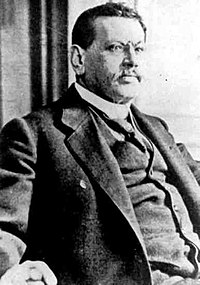Hugo Preuß
| Hugo Preuß | |
|---|---|
 |
|
|
Reich Minister of the Interior Weimar Republic |
|
|
In office 13 February 1919 – 20 June 1919 |
|
| Chancellor | Philipp Scheidemann |
| Preceded by | Friedrich Ebert (Council of the People's Deputies) |
| Succeeded by | Eduard David |
| Personal details | |
| Born |
28 October 1860 Berlin, Kingdom of Prussia |
| Died | 9 October 1925 (aged 64) Berlin, Weimar Republic |
| Nationality | German |
| Political party | German Democratic Party |
| Alma mater |
University of Berlin, University of Heidelberg |
Hugo Preuß (Preuss) (28 October 1860 – 9 October 1925) was a German lawyer and liberal politician. He was the author of the draft version of the constitution that was passed by the Weimar National Assembly and came into force in August 1919. He based it on three principles: all political authority belongs to the people; that the state should be organized on a federal basis; and that the Reich should form a democratic Rechtsstaat (state based in law) within the international community.
Hugo Preuß was born in Berlin on 28 October 1860 as the only child of Levin Preuß (1820 or 1821-62), a Jewish owner of a lithographic business, and his wife Minna (née Israel, 1826–99). Hugo's father died in 1862 and in 1863 his mother married her husband's brother, Leopold Preuß (1827–1905), a well-off grain merchant. After growing up in the western part of Berlin Hugo Preuß attended university from 1878 at Berlin and Heidelberg, studying Rechts- und Staatswissenschaften (law and governance) but with additional courses on history and philosophy. In May 1883, he passed the 1. Staatsexamen and in November was awarded the Dr. iur. at Göttingen. He stopped working as a legal Referendar in 1886 and instead chose a career as an academic teacher. In 1889, he was habilitated with his publication Gemeinde, Staat, Reich als Gebietskörperschaften and began working as a Privatdozent (lecturer) at the university in Berlin. Although the quality of his writings was appreciated by academia, his Jewish religion and democratic-liberal views prevented him from becoming a tenured professor at the conservative Berlin university.
In 1889, Preuß also married Else Liebermann, daughter of Carl Liebermann in Berlin. She was also related to Max Liebermann, the artist, and to Felix Liebermann. Hugo and Else had four sons, one of whom died early. The others were Ernst (*1891), Kurt (*1893) and Jean (Hans, *1901).
In 1895, he became a member of the municipal parliament in Charlottenburg, Berlin. Only in 1906 did Preuß become a full professor, at the Berliner Handelshochschule newly founded by local merchants. He taught there until 1918, when he also was Rektor. His main focus was on constitutional law and on autonomous municipal administration (kommunale Selbstverwaltung). In 1906, the first volume of Die Entwicklung des deutschen Städtewesens was published. From 1910-18 he was honorary city councillor for the FVP. In this capacity he contributed to the project that what would later become the Greater Berlin Act. In 1912, he unsuccessfully ran for a seat in the Reichstag. In his widely read publication Das deutsche Volk und die Politik of 1915 he forcefully argued for a transformation of the Obrigkeitsstaat into a Volksstaat.
...
Wikipedia
